William Poole, born 200 years ago today in New Jersey, was one of the most infamous villains in New York City history.
As a young man, he operated as a butcher at Washington Market (in the area of today’s Tribeca neighborhood) and that legitimate occupation lent him his nickname earned by his more disreputable activities — Bill the Butcher.
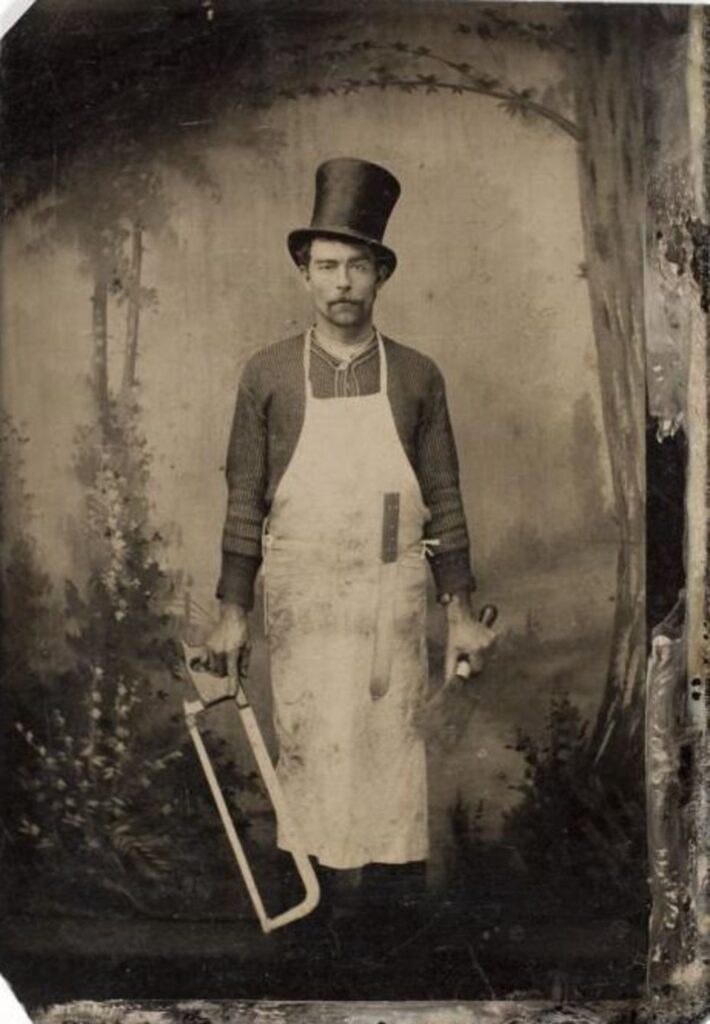
Poole was a thug, a thief and a celebrity, leader of a Christopher Street gang which morphed and coalesced with others to become one of the most terrifying group of criminals in New York — the Bowery Boys.
We kn0w details of his life not only from classics like Gangs of New York but because of the unique nature between gangs and city politics in the mid 19th century. Street gangs were often aligned with political and social beliefs about the changing city — particularly the ships of newly arriving immigrants from Ireland.
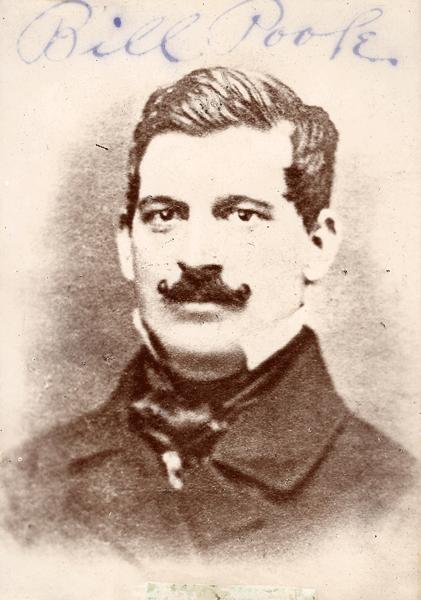
The Bowery Boys were an instrument of the Know Nothings, a nativist movement which violently rejected the Irish newcomers. Their attacks on immigrants on the streets of Five Points were so severe that Irish gangs soon formed in retaliation, collectively referred to in the press as the Dead Rabbits.
This street level violence echoed the loftier nativist debates happening at City Hall and in the penny press. But Poole was no dignified man. His habits of proving himself a real ‘native American’ were distinctly chaotic and bloodthirsty.
Just one example from the New York Daily Herald, January 16, 1846: “William Poole and Smith Ackerman were amusing themselves by putting two dogs to fight in Christopher Street, creating a most disgraceful riot.” When a man stepped in to stop the dog fight, Poole and Ackerman gauged out his eye.
The journalist Herbert Asbury was so fascinated by Poole that in his classic Gangs of New York, he devotes an entire chapter to the man’s brutal murder in 1855.
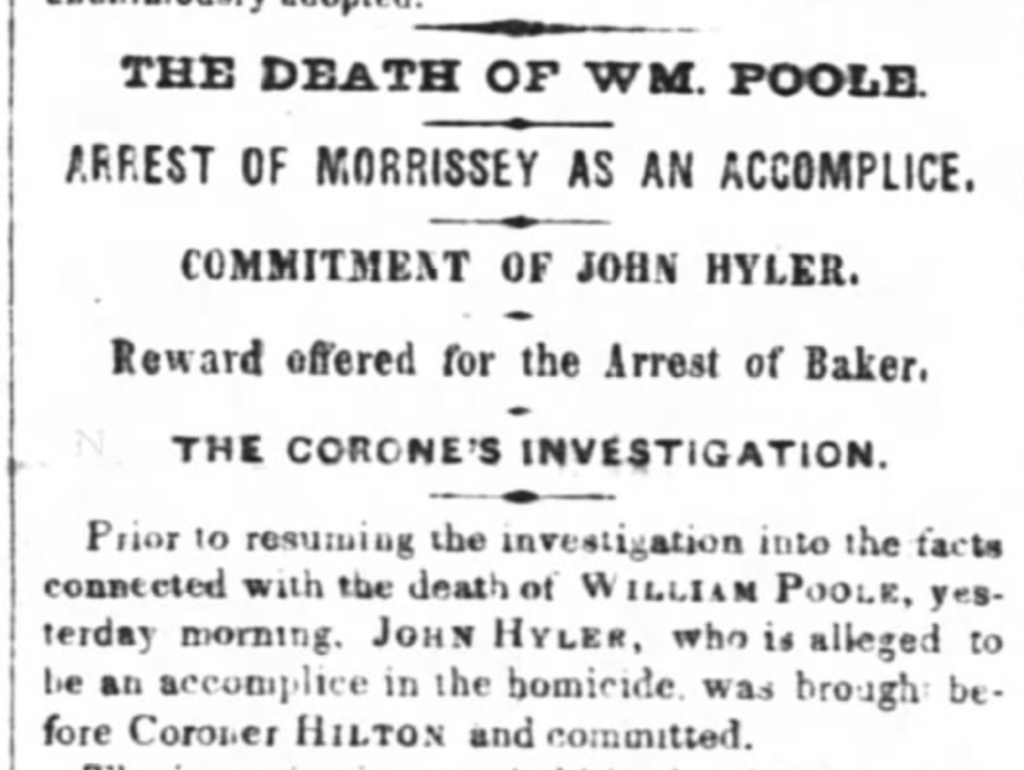
Poole was shot through the heart at Stanwix Hall (579 Broadway) by Tammany Hall sluggers Lewis Baker on behalf of Poole’s rival John Morrissey.
“Despite his wounds,” writes Asbury:
“Poole lived for fourteen days after the shooting, to the vast amazement of his doctors, who declared vehemently that it was unnatural for a man to linger so long with a bullet in his heart.
But at last, while other Native American gladiators watched anxiously by his bedside and relayed bulletins to a sorrowful crowd in the street, Bill the Butcher died, gasping with his last breath: ‘Good-bye, boys, I die a true American!‘”
He was buried at Green-Wood Cemetery in a funeral befitting a decorated war hero with thousands of mourners and over 150 carriages in a long, mournful procession.
The words ‘I die a true American!’ were actually emblazoned upon the side of the hearse carrying his flag-draped coffin.
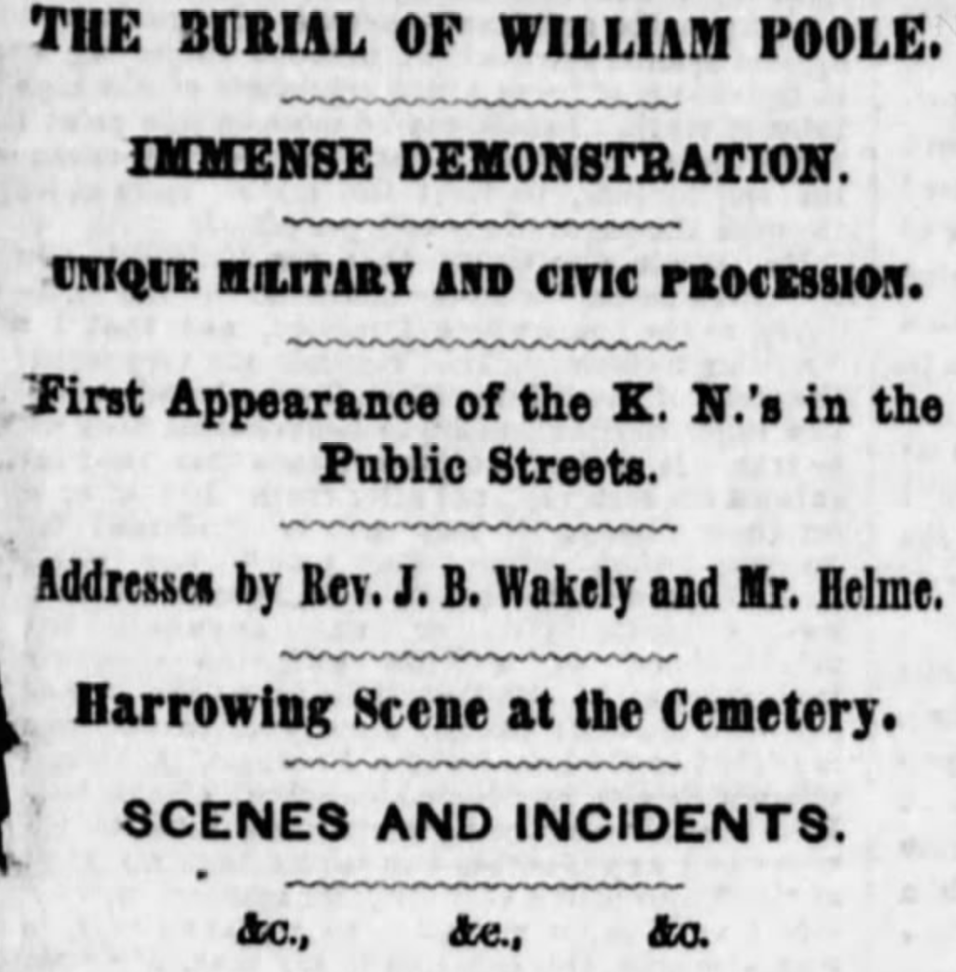
In the 2002 film Gangs of New York, directed by Martin Scorsese, a version of William Poole (named William Cutting) is depicted with genuine grit and horror by Daniel Day Lewis.
While the film is entirely fictional — liberally taking from various tales from Asbury’s book — Lewis’ Bill the Butcher has a grotesque and villainous quality that the real William Poole would have loved.
For more information, check out our podcast on the movie Gangs of New York:

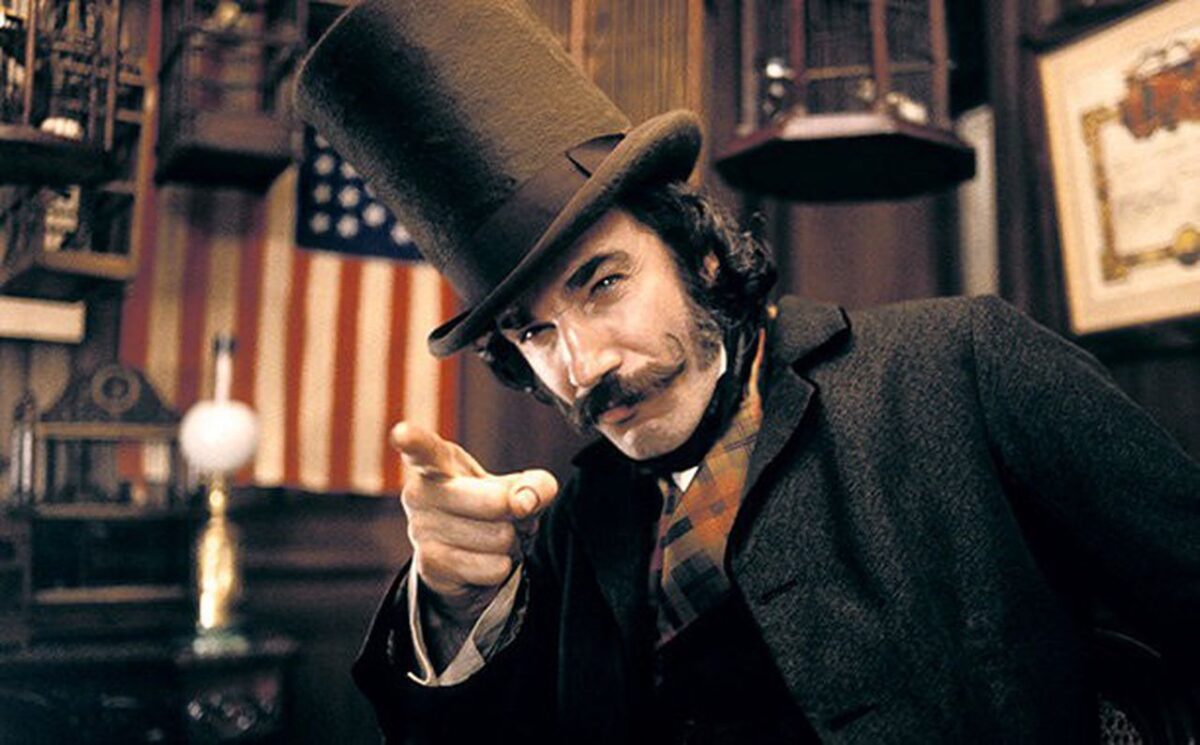
11 replies on “William Poole, aka Bill the Butcher, was born 200 years ago”
We don’t allow hostile rants in the comments section. This isn’t a political blog. It’s for people to share stories and exchange information about New York history. If you have a complaint, email us.
This article was merely to mark the birthday of a legendary historical figure who has become famous in current pop culture because of the film Gangs of New York. It was not a dissertation or an expose on 19th century gang activity; it was just a two-minute bit of fun for people who are familiar with the book and movie. Many people understand that Asbury was often a fabulist (or more charitably, a folklorist). Topics like the b’hoys, the complicated descriptions of ‘gangs’ and even the true nature of the Dead Rabbits (See here) have been regularly explored on this website and podcast, as well as by leading historians and writers of these subjects.
If you have an upcoming project about Asbury and the gangs of New York, I’m sure our readers and listeners would love to know more. Please let us know when it is available. Perhaps we could use the occasion to focus more critically upon Asbury’s influence in a future show.
Good reply to Jackson Landers ranting/raving. Obviously, he’s a know-it-all relying on an absence of information in certain publications to support his angry responses.
With all due respect I think your answer was quite disingenuous , avoiding all of his points and unfairly calling it a “hostile rant” . I don’t know enough about the subject to be in one side or the other but I just wanted to point out objectively that his comment was definitely not a “hostile rant” and it seems like maybe you exaggerated to try and negate his argument, possibly in the absence of any valid refutation of his argument. Just my two pence. Also just because somebody doesn’t write articles or create web projects on a subject doesn’t invalidate their opinion or prevent them from being entitled to one.
Are there any living descendants of William Poole? Does his family still exist?
William Poole and the Poole family originates all the way back to England (predominantly Suffolk, Staffordshire and Sussex). I am a living descendant of the Poole family. A lot of my ancestors settled in America (Louisiana, New York, Salt Lake City Utah). And our branch of the family between Glasgow and Edinburgh, Scotland). Funnily enough my Grandfather was William Poole and so was his Father (My Great Grandfather) and their son’s William Poole also.
Dan, that’s cool that you’re a descendant of the Poole family, and that you know a lot of history.
I have read that Bill the Butcher was born in Sussex County, NJ. Do you have any idea on a more precise birth place within Sussex County? I’ll be visiting Sussex County next week, and if there was more information available (like town), I’d love to visit his birthplace.
I have a willie the butcher wooden coin. Would the family be interested in that?
This is some GREAT banter! Great story & great history, all while I watch ‘Gangs of New York’ and learn up on William, aka Bill the Butcher Poole. Great context here.
I grew up in the NYC Metro area in the 1970s and 1980s so I have a great interest in the subject. I am also of English (and Irish) decent. I love history and genealogy as well. I can imagine NYC in the late 1850s/early 1860s with civil war brewing AND incoming Irish, most of whom were Catholic, escaping the potato famine and rushing to mostly Boston, NYC, and Baltimore, MD. TRULY a powder keg ready to blow. Fascinating indeed!
The Dead Rabbits are mentioned either by that name or as the Mulberry Street Gang in contemporary sources. Boxer and later U.S. Congressman John Morrissey is counted among their leaders. They spun off from the Roach Guard – another confirmed gang – at least by 1852 and possibly earlier. Confirmed here by a piece in the NY Tribune, July 6, 1857 as having formed at least 5 years earlier. This also mentions their hierarchy of club officers as you suggested they would have had.
https://www.newspapers.com/image/79074716/
Separately, the Bowery Boys were founded by a guy named Michael Walsh who went on to be a U.S. Congressman also, and the gang is mentioned in any bio of the man. I’m not sure how you can claim no such gang ever existed there either, but again contemporary sources disagree. Same article accounting the events of the riot, they’re mentioned several times.
What do you know? Rhe dead rabbits and the bowery boys were real gangs. What proof do you have?